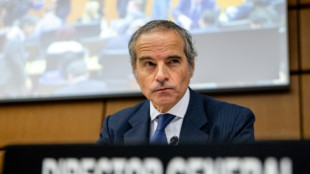
-
 US Justice Dept releasing new batch of Epstein files
US Justice Dept releasing new batch of Epstein files
-
South Africa and Israel expel envoys in deepening feud

-
 French eyewear maker in spotlight after presidential showing
French eyewear maker in spotlight after presidential showing
-
Olympic dream 'not over', Vonn says after crash

-
 Brazil's Lula discharged after cataract surgery
Brazil's Lula discharged after cataract surgery
-
US Senate races to limit shutdown fallout as Trump-backed deal stalls

-
 'He probably would've survived': Iran targeting hospitals in crackdown
'He probably would've survived': Iran targeting hospitals in crackdown
-
Djokovic stuns Sinner to set up Australian Open final with Alcaraz

-
 Mateta omitted from Palace squad to face Forest
Mateta omitted from Palace squad to face Forest
-
Djokovic 'pushed to the limit' in stunning late-night Sinner upset

-
 Tunisia's famed blue-and-white village threatened after record rains
Tunisia's famed blue-and-white village threatened after record rains
-
Top EU official voices 'shock' at Minneapolis violence

-
 Kremlin says agreed to halt strikes on Kyiv until Sunday
Kremlin says agreed to halt strikes on Kyiv until Sunday
-
Carrick calls for calm after flying start to Man Utd reign

-
 Djokovic to meet Alcaraz in Melbourne final after five-set marathon
Djokovic to meet Alcaraz in Melbourne final after five-set marathon
-
Italian officials to testify in trial over deadly migrant shipwreck

-
 Iran says defence capabilities 'never' up for negotiation
Iran says defence capabilities 'never' up for negotiation
-
UN appeals for more support for flood-hit Mozambicans

-
 Lijnders urges Man City to pile pressure on Arsenal in title race
Lijnders urges Man City to pile pressure on Arsenal in title race
-
Fulham sign Man City winger Oscar Bobb

-
 Strasbourg's Argentine striker Panichelli sets sights on PSG, World Cup
Strasbourg's Argentine striker Panichelli sets sights on PSG, World Cup
-
Jesus 'made love': Colombian president irks Christians with steamy claim

-
 IAEA board meets over Ukraine nuclear safety concerns
IAEA board meets over Ukraine nuclear safety concerns
-
Eurozone growth beats 2025 forecasts despite Trump woes

-
 Dutch PM-elect Jetten says not yet time to talk to Putin
Dutch PM-elect Jetten says not yet time to talk to Putin
-
Social media fuels surge in UK men seeking testosterone jabs

-
 Forest face Fenerbahce, Celtic draw Stuttgart in Europa League play-offs
Forest face Fenerbahce, Celtic draw Stuttgart in Europa League play-offs
-
US speed queen Vonn crashes at Crans-Montana, one week before Olympics

-
 Trump nominates former US Fed official as next central bank chief
Trump nominates former US Fed official as next central bank chief
-
New Dutch government pledges ongoing Ukraine support

-
 Newcastle still coping with fallout from Isak exit, says Howe
Newcastle still coping with fallout from Isak exit, says Howe
-
Chad, France eye economic cooperation as they reset strained ties

-
 Real Madrid to play Benfica, PSG face Monaco in Champions League play-offs
Real Madrid to play Benfica, PSG face Monaco in Champions League play-offs
-
Everton winger Grealish set to miss rest of season in World Cup blow

-
 Trump brands Minneapolis nurse killed by federal agents an 'agitator'
Trump brands Minneapolis nurse killed by federal agents an 'agitator'
-
Arteta focuses on the positives despite Arsenal stumble

-
 Fijian Drua sign France international back Vakatawa
Fijian Drua sign France international back Vakatawa
-
Kevin Warsh, a former Fed 'hawk' now in tune with Trump

-
 Zverev rails at Alcaraz timeout in 'one of the best battles ever'
Zverev rails at Alcaraz timeout in 'one of the best battles ever'
-
Turkey leads Iran diplomatic push as Trump softens strike threat

-
 Zelensky backs energy ceasefire, Russia bombs Ukraine despite Trump intervention
Zelensky backs energy ceasefire, Russia bombs Ukraine despite Trump intervention
-
'Superman' Li Ka-shing, Hong Kong billionaire behind Panama ports deal

-
 Skiing great Lindsey Vonn crashes at Crans-Montana, one week before Olympics
Skiing great Lindsey Vonn crashes at Crans-Montana, one week before Olympics
-
Slot warns Liverpool 'can't afford mistakes' in top-four scrap

-
 Paris show by late Martin Parr views his photos through political lens
Paris show by late Martin Parr views his photos through political lens
-
Artist chains up thrashing robot dog to expose AI fears

-
 Alcaraz outlasts Zverev in epic to reach maiden Australian Open final
Alcaraz outlasts Zverev in epic to reach maiden Australian Open final
-
French PM forces final budget through parliament

-
 French-Nigerian artists team up to craft future hits
French-Nigerian artists team up to craft future hits
-
Dutch watchdog launches Roblox probe over 'risks to children'


Lead poisoning causes far more death, IQ loss than thought: study
Lead poisoning has a far greater impact on global health than previously thought, potentially contributing to over five million deaths a year and posing a similar threat to air pollution, modelling research suggested Tuesday.
The study, described as "a wake-up call", also estimated that exposure to the toxic metal causes young children in developing countries to lose an average of nearly six IQ points each.
Lead pollution has been shown to cause a range of serious health problems, particularly relating to heart disease and the brain development of small children, resulting in leaded gasoline being banned worldwide.
But people can still be exposed to the potent neurotoxin via food, soil, cookware, fertilisers, cosmetics, lead–acid car batteries and other sources.
The authors of the new study, two economists at the World Bank, was published in the Lancet Planetary Health journal. They said it was the first to assess the impact of lead exposure on heart disease deaths and child IQ loss in wealthy and developing nations.
Lead author Bjorn Larsen told AFP that when the pair first saw the figure their model calculated, "we didn't even dare to whisper the number" because it was so "enormous".
Their model estimates that 5.5 million adults died from heart disease in 2019 because of lead exposure, 90 percent of them in low- and middle-income countries.
That is six times higher than the previous estimate, and represents around 30 percent of all deaths from cardiovascular disease -- the leading cause of death worldwide.
It would mean that lead exposure is a bigger cause of heart disease than smoking or cholesterol, Larsen said.
- $6 trillion cost -
The research also estimated that children under five lost a cumulative 765 million IQ points due to lead poisoning globally in 2019, with 95 percent of those losses coming in developing countries.
That number is nearly 80 percent higher than previously estimated.
The World Bank researchers put the economic cost of lead exposure at $6 trillion in 2019, equivalent to seven percent of global gross domestic product.
For the analysis, the researchers used estimates of blood lead levels in 183 countries taken from the landmark 2019 Global Burden of Disease study.
Previous research had measured only lead's effect on heart disease when it came to raising blood pressure. But the new study looked at numerous other ways lead affects hearts, such as the hardening of arteries that can lead to stroke, resulting in the higher numbers, Larsen said.
Roy Harrison, an expert in air pollution and health at Birmingham University in the UK, who was not involved in the study, told AFP it was "interesting, but subject to many uncertainties".
For example, the relationship between lead in blood and heart disease is based on a survey in the United States, and whether those findings could be applied worldwide "is a huge jump of faith", he said.
Harrison also pointed out that the model used estimations -- not tests -- of lead in blood in many developing countries.
If the results were confirmed, "they would be of major public health significance, but at present, this is simply an interesting hypothesis", he said.
- 'Piece of the puzzle' -
Richard Fuller, president of the NGO Pure Earth, said that when surveys in developing countries did test for lead in blood, they mostly found higher levels than estimated in the new study.
This means "the impact of lead might be worse than the report describes", he told AFP, calling it a "wake-up call".
Larsen said "we're still a little in the dark" when it came to understanding how much different sources of lead contribute to blood contamination.
Fuller said part of this "missing piece of the puzzle" was revealed in a Pure Earth report released on Tuesday, which analysed 5,000 samples of consumer goods and food in 25 developing countries.
It found high rates of lead contamination in metal pots and pans, ceramic cookware, paint, cosmetics and toys.
"This is why poorer countries have so much lead poisoning," Fuller said. "It's items in the kitchen that are poisoning them."
E.Burkhard--VB



